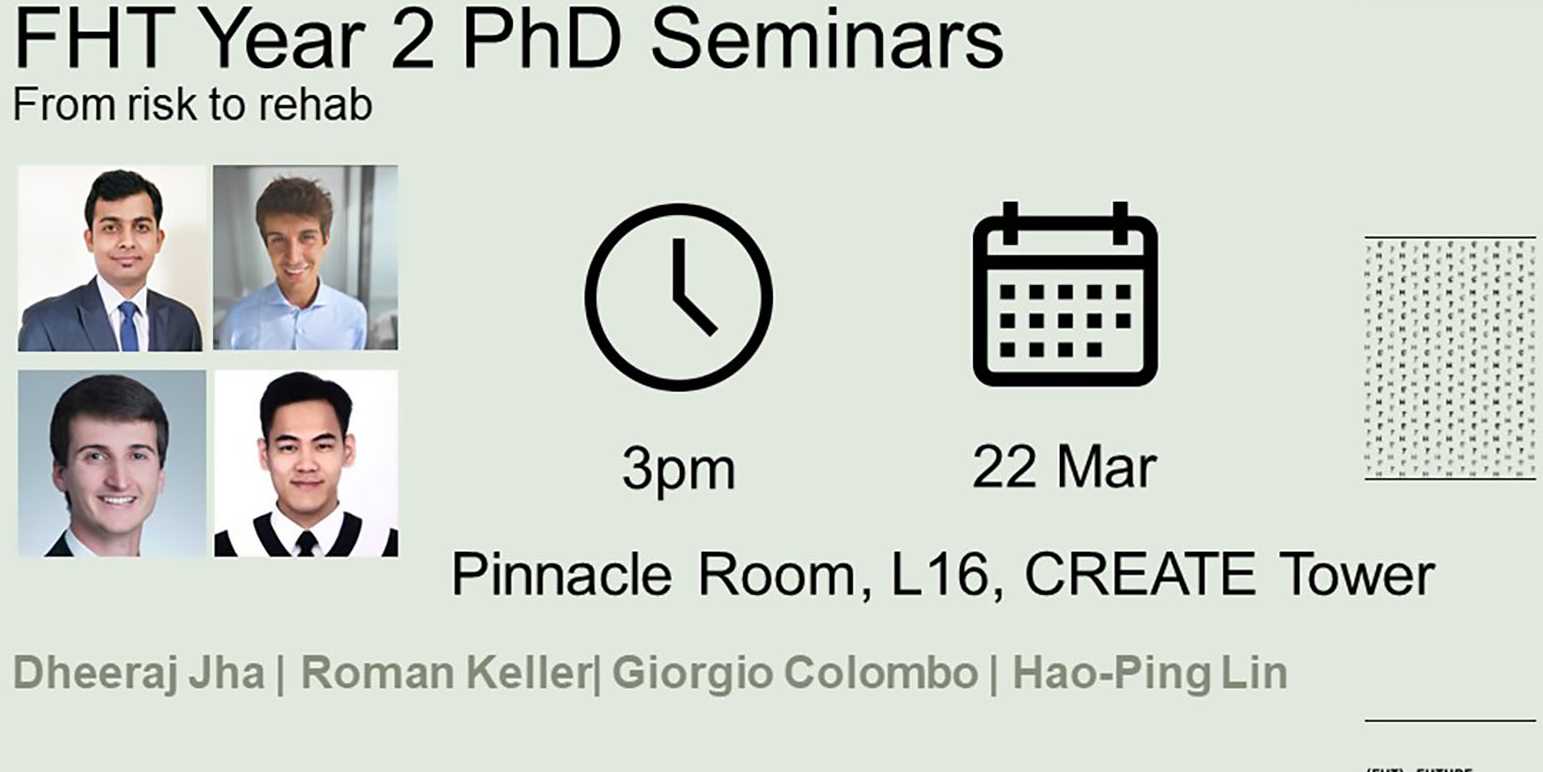
FHT Year 2 PhD Seminars: From risk to rehab
22 Mar | Four FHT researchers will showcase their ongoing projects in detecting dementia, just-in-time mobile interventions, stroke rehabiltation and reducing hip fracture risk.
FHT PhD Seminars - Join us for the latest updates from our promosing researchers
Date: Wed, 22 March
Time: 3-5pm (SGT)
Venue: PINNACLE Room, Level 16, CREATE Tower
Zoom link: external page https://ethz.zoom.us/j/68297065506
Presenters: Dheeraj Jha | Roman Keller| Giorgio Colombo | Hao-Ping Lin
This series of PhD seminars brings together FHT's community and interested parties to listen to research updates from fellow researchers working towards their PhDs. This seminar series features four researchers in their second year at FHT. The seminars will be chaired by Dr Karolina Minta and Dr Simone Kager, respectively.
Seminars
Chaired by Dr. Karolina Minta (3-4 pm)

Dheeraj Jha, PhD Researcher
Hip Fracture Prevention in the Elderly Population
Recent studies have shown that Singapore is challenged with one of the most rapidly ageing populations due to increasing life expectancy and reducing birth rates. One of the major challenges associated with ageing societies is a higher prevalence of chronic diseases and concomitant healthcare costs. There are also socioeconomic costs incurred, which in turn leads to a reduction in economic growth. Osteoporosis is one of the chronic diseases that significantly impact the elderly population. It is characterized by reduced bone mass, resulting in increased bone fragility and fracture risk with age. The current clinical standard for the diagnosis of osteoporosis involves a T-score based on areal bone mineral density (aBMD) obtained from dual-energy X-ray absorptiometry (DXA), which has only moderate sensitivity. The successful execution of this work will provide clinicians with a tool to predict fracture risk with higher accuracy than achievable with DXA scans alone. At the same time, it can also help them assess the effectiveness of different preventive methods for reducing hip fracture risk. This will create a sustainable cost-effective healthcare model to manage hip fracture risk in the elderly Singaporean population.

Roman Keller, PhD Researcher
Conceptualising the State-of-Receptivity in a Holistic Lifestyle Intervention
Recent advancements in sensor-rich mobile and wearable devices have enabled new opportunities for the design of mHealth interventions, such as just-in-time adaptive interventions (JITAIs). JITAIs aim to deliver the right amount of support at the right time. One crucial mechanism for developing efficacious JITAIs is to ideally time the delivery of support to ensure that users are receptive, i.e., willing and able to receive, process, and use the support provided. While prior research has primarily explored receptivity in the context of generic phone notifications, little is known about the behavioural component of receptivity and whether users are willing and able to engage with delivered content. My PhD, therefore, has three key aims: (1) to identify the degree to which current state-of-the-art digital behavioural change interventions are employing JITAI mechanisms; (2) to evaluate the relation between users’ contextual factors and their ability to receive, process, and use the support provided in a holistic health intervention; (3) to investigate the personal, contextual, and temporal predictors of receptivity to and compliance with ecological momentary assessment (EMA) prompts.
Seminars
Chaired by Dr. Simone Kager (4-5 pm)

Giorgio Colombo, PhD Researcher
Navigation Ability and Cognitive Decline
Dementia is an escalating global health issue, and the early identification of Mild Cognitive Impairment (MCI) is critical in mitigating its effects. MCI is the transitional stage between healthy aging and dementia and is often overlooked due to its subtle symptoms and gradual onset. Currently, the diagnosis of MCI is a complex process that relies on invasive and expensive procedures, such as blood biomarkers and PET scans, or less sensitive paper and pencil tests. However, the emergence of Virtual Reality (VR) technology has shown promise as a digital marker for capturing early signs of cognitive impairment. In particular, individual differences in spatial ability have been identified as a sensitive marker that can assist in differentiating between healthy individuals and those affected by MCI. In this presentation, I will deliver an update on the progress made in developing the Spatial Performance Assessment for Cognitive Evaluation (SPACE). I'll discuss the challenges we faced during the pilot testing phase, and the various new features we introduced to address them. The presentation will also share preliminary data from a usability study currently being conducted at the Singapore-ETH Centre. Specifically, it will focus on the correlations observed within each task in SPACE and their relationship with MoCA and age.

Hao-Ping Lin, PhD Researcher
Deep Myo: Myo armband-based EMG signal decoding and gesture classification using deep learning
Stroke survivors often experience impaired hand and wrist function, leading to difficulties in their daily activities and overall quality of life. To address this issue, the MyoPanda project aims to develop a mobile and scalable hand and wrist stroke therapy approach using electromyography (EMG)-based neurofeedback through the Myo armband. The Myo armband-based EMG signals of fine finger movements are decoded and classified using deep learning techniques, which will be integrated as part of our MyoPanda training platform. This approach offers the potential to test various types of task- specific and user-centric treatment regimens, as well as the effects of unsupervised or at-home applications given the portability and simplicity of the armband. Additionally, to ensure the quality of the unsupervised therapy, the feasibility of real- time detection of post-stroke compensatory movements using computer vision will also be explored.